
Twitter User Says Teachers Shouldn’t Force Anxious Students To Present In Front Of The Class, Sparks A Heated Discussion
Remember the times you had to present on some topic or a book in front of your class? You know, those ten to twenty minutes of unease, fear and worry that something will go wrong or that someone will trample your vulnerable public presentation with a question you can’t answer because you’re too worried you’ll forget how words work?
Well, that feeling is somewhat universal, but it becomes a bigger problem for those who have inherent issues with anxiety. One such lad recently took to Twitter to propose that people with anxiety shouldn’t have to present in front of classes, pointing out that there are alternatives to how this can be managed, subsequently launching a debate online.
Presentations in front of the class are hard as it is and it’s even harder for those with anxiety
Image credits: wimklerkx.nl
A Twitter user by the name of Jordan (@bluexmasgcv) recently ranted that those who suffer from anxiety shouldn’t be required to present in front of the class.
Jordan continued that he himself was lucky enough to have a teacher who was understanding enough to let him present privately, thus reducing the amount of stress and fear involved in the process, but schools should seriously consider providing some alternative ways for anxious kids to submit their projects without getting their points deducted for being uncontrollably anxious during the whole thing.
So, this Twitter user suggested that schools shouldn’t force anxious people to present in front of class
Image credits: bluexmasgcv
For those unaware of what it feels like to have an anxiety disorder, consider this: imagine feeling an unrelenting sense of dread and fear all the time because of being convinced that whatever you do has a high chance of failing and you will be punished for it or it will cause harm to you, spiraling down an endless hole of anxious intrusive thoughts that leave you drained pretty much all the time.
This is just the gist of what’s going through an anxious person’s mind. The experience may vary, but the feeling is uneasy and often unending in many cases.
This prompted quite a discussion amongst commenters. On the one hand, people were agreeing that forcing someone with an anxiety disorder is counterproductive. It may not in fact leave them with a sense of accomplishment and boost their confidence but rather break them down even more because they will not feel understood or empathized with.
The tweet thread sparked a deabate with people on one side agreeing with Jordan
Image credits: dazzdazzle
Image credits: the_tide_loose
Image credits: ThatHomosexual
Image credits: Minettegia
Image credits: itsnicetosmile
Others pointed out that there is also the problem with teachers simply not caring about the well-being of their students and responding with negative reinforcement like giving a bad grade or even yelling at the students for not presenting. This subsequently leads to even greater anxiety.
There were people who, however, disagreed with this. For one, public speaking is an invaluable skill that does actually reinforce in positive ways—the aforementioned self-esteem boost and empowering people to express themselves in proper ways are just a few examples.
Also, getting rid of the requirement for people to present just because someone has anxiety isn’t tackling the issue at hand—the presentation is a thing that the person perceives as the source of fear, but in reality it’s their own perception that is causing them anxiety, so dealing with this toxic view of things would be the effective way of dealing with the problem.
Others, on the other hand, disagreed as public speaking is an important skill to have
Image credits: 333nikita
Image credits: writejsk
Image credits: nctot21ftw
Some even touched upon how things like speech impediments might make the issue even more problematic as, for the most part, people stress because of the speech impediment and they can’t get rid of it to relieve their anxiety when speaking in public to make their speech better, consequently putting them into a vicious loop that some teachers might not understand and still dock points for, further reinforcing the problem.
The issue is obviously nowhere near one-sided as there are many nuances and factors involved and more than one solution to the problem. However, regardless, it is important to consider that ignoring mental disorders is never an option as it is estimated that nearly 40 million people in the United States—18%—experience an anxiety disorder in any given year, and the wrong means of dealing with it may likely cause a rise in this percentage.
There were also people who pointed out how it’s even harder for those with speech impediments
Image credits: darbybrennan22
Image credits: clownfour1d
Image credits: kiku_is_my_son
Image credits: KilMySnflwerMnd
Image credits: halo_larry28
Here’s what the rest of the internet had to say about it
Image credits: imaginehunter12
Image credits: star_dusk1117
Image credits: wangjiluvbot
Image credits: maddiialexius
Image credits: exlit_
The tweet drew quite a bit of attention, getting over 159,000 likes in just a day. The tweet was retweeted over 28,000 times with 3,500 quoted tweets.
What are your thoughts on this? Did you enjoy speaking in front of the class, or was it also overly stress inducing? Let us know in the comment section below.
65Kviews
Share on FacebookMy shrink told me that the only way to overcome anxiety is to do the thing that makes you anxious... after enough repetitions it stops causing the extreme anxiety (granted taking "baby steps"). You will need this skill in your future. The real problem seems to be some of the teachers. There should a requirement to grade you from the level of your own starting ability and your own personal growth.
Good luck on overcoming your anxiety (or at least getting it to a manageable level)! I have a sister with crippling anxiety and her Dr is also doing exposure therapy and it's really making a difference. I feel terrible for the kids with anxiety, but looking at it from the teacher's perspective, they might feel like if they let one kid out of presenting, the whole class will claim to have anxiety just to get out of doing it. I'm not saying that's right or wrong, but it is a factor. You're also right about it being a necessary skill... If you're applying for a job you can't request that the employer let you skip the interview because it gives you anxiety. I know the kids can't just "suck it up" or "get over it" because that's not how anxiety works... It's more than being nervous or a little scared. I think the kids with anxiety need to get into treatment. Exposure therapy doesn't work for everyone, but there are other therapies that can help get your anxiety to a manageable level.
Load More Replies...I'm a teacher and I have dealt with my own anxiety issues, so I can totally understand when a student is suffering it. To overcome this condition is not a matter of will, as it's a mental disease. You don't tell people with a coldthat if they stay positive it eventually will disappear. It's the same thing about anxiety. So, what do I do when I encounter a student dealing with this problem? We deal with the fear. The first time they read a text we're alone in the room, even if that means no break between classes. If they feel con fident enough to do a presentation in class, I'll be by their side boosting their confidence. Speaking in public is an important skill, but some people take a little more time to achieve it and that's ok.
You sound exactly the kind of person pupils need in the classes - can we have you cloned? Honestly, forcing people to do things doesn't eradicate fear. It can cause people to be overwhelmed and worsen the anxiety. Dealing with something like this is a stepped process and can only be achieved with proper support and those who know who to help professionally. Parents and teachers should work together to find therapists for children with genuine and severe anxiety.
Load More Replies...This is so entitled I'm struggling to stay polite. The idea that students can opt out of a part of the class because they don't like it is insulting. Some people get massive test anxiety, should they not be required to take exams? I personally couldn't stand sitting still for more than 5 minutes (ADHD), but my teachers didn't let me get up and wander around all the damn time because it was disruptive to the rest of the class. Trigonometry gave me fits, and I had to do 10 or so hours of practice problems every week just to keep up, which SUCKED by the way. But I got an A. Doing things that make us uncomfortable is how we learn to tolerate discomfort. It's called LEARNING, and is the whole point of school. I mean, why go if you're only going to do the things that you're already good at over and over?
Never had to do this in school, no presenting of anything. We did have to read aloud but that's somewhat easier for most people as they're not having to come up with their own words. Of course it's different for those who have a stutter or dyslexia but then those pupils should be getting additional support. Anxiety is also not the same thing at all as being 'uncomfortable' doing something. I don't enjoy public speaking but I became proficient at it as part of my job - when you know your subject well it can help. I wasn't anxious though. School is about learning but they have to accept that those with additional problems should have additional support or a different approach. We can and should make accommodations.
Load More Replies...My shrink told me that the only way to overcome anxiety is to do the thing that makes you anxious... after enough repetitions it stops causing the extreme anxiety (granted taking "baby steps"). You will need this skill in your future. The real problem seems to be some of the teachers. There should a requirement to grade you from the level of your own starting ability and your own personal growth.
Good luck on overcoming your anxiety (or at least getting it to a manageable level)! I have a sister with crippling anxiety and her Dr is also doing exposure therapy and it's really making a difference. I feel terrible for the kids with anxiety, but looking at it from the teacher's perspective, they might feel like if they let one kid out of presenting, the whole class will claim to have anxiety just to get out of doing it. I'm not saying that's right or wrong, but it is a factor. You're also right about it being a necessary skill... If you're applying for a job you can't request that the employer let you skip the interview because it gives you anxiety. I know the kids can't just "suck it up" or "get over it" because that's not how anxiety works... It's more than being nervous or a little scared. I think the kids with anxiety need to get into treatment. Exposure therapy doesn't work for everyone, but there are other therapies that can help get your anxiety to a manageable level.
Load More Replies...I'm a teacher and I have dealt with my own anxiety issues, so I can totally understand when a student is suffering it. To overcome this condition is not a matter of will, as it's a mental disease. You don't tell people with a coldthat if they stay positive it eventually will disappear. It's the same thing about anxiety. So, what do I do when I encounter a student dealing with this problem? We deal with the fear. The first time they read a text we're alone in the room, even if that means no break between classes. If they feel con fident enough to do a presentation in class, I'll be by their side boosting their confidence. Speaking in public is an important skill, but some people take a little more time to achieve it and that's ok.
You sound exactly the kind of person pupils need in the classes - can we have you cloned? Honestly, forcing people to do things doesn't eradicate fear. It can cause people to be overwhelmed and worsen the anxiety. Dealing with something like this is a stepped process and can only be achieved with proper support and those who know who to help professionally. Parents and teachers should work together to find therapists for children with genuine and severe anxiety.
Load More Replies...This is so entitled I'm struggling to stay polite. The idea that students can opt out of a part of the class because they don't like it is insulting. Some people get massive test anxiety, should they not be required to take exams? I personally couldn't stand sitting still for more than 5 minutes (ADHD), but my teachers didn't let me get up and wander around all the damn time because it was disruptive to the rest of the class. Trigonometry gave me fits, and I had to do 10 or so hours of practice problems every week just to keep up, which SUCKED by the way. But I got an A. Doing things that make us uncomfortable is how we learn to tolerate discomfort. It's called LEARNING, and is the whole point of school. I mean, why go if you're only going to do the things that you're already good at over and over?
Never had to do this in school, no presenting of anything. We did have to read aloud but that's somewhat easier for most people as they're not having to come up with their own words. Of course it's different for those who have a stutter or dyslexia but then those pupils should be getting additional support. Anxiety is also not the same thing at all as being 'uncomfortable' doing something. I don't enjoy public speaking but I became proficient at it as part of my job - when you know your subject well it can help. I wasn't anxious though. School is about learning but they have to accept that those with additional problems should have additional support or a different approach. We can and should make accommodations.
Load More Replies...
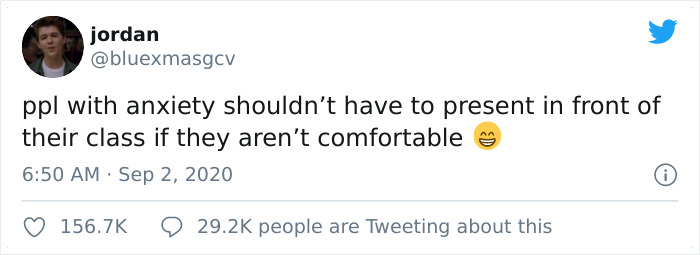
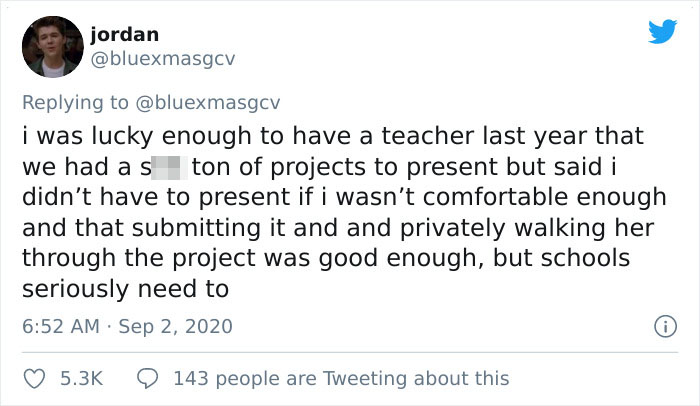
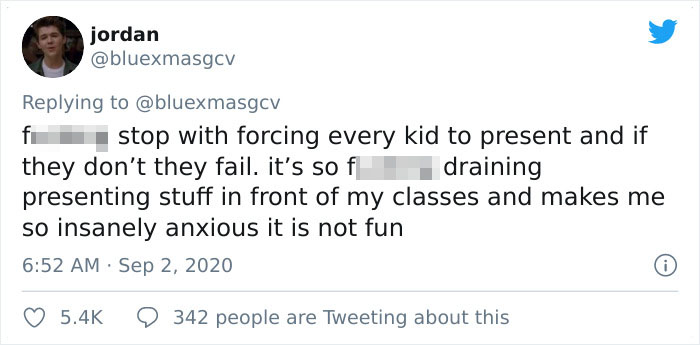
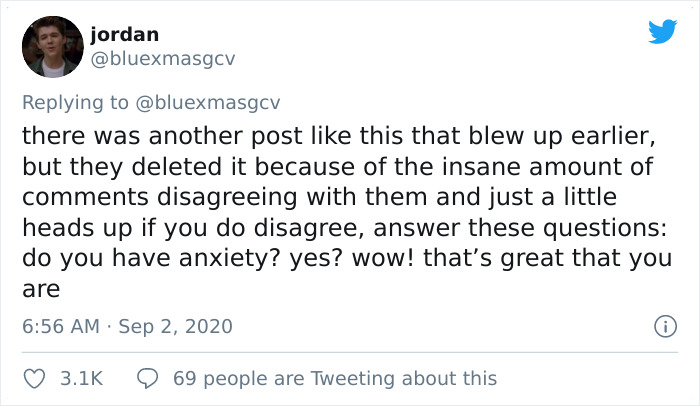
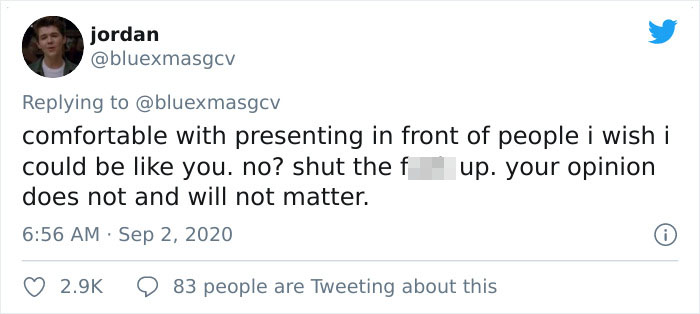
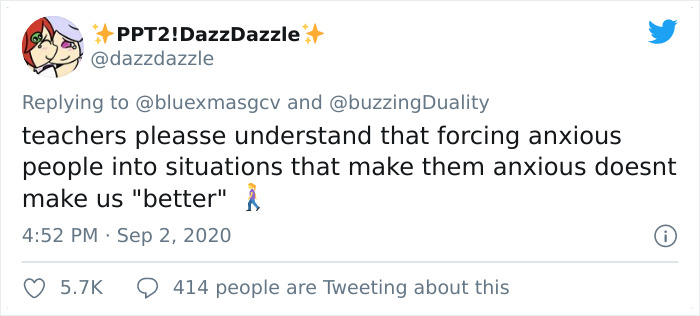
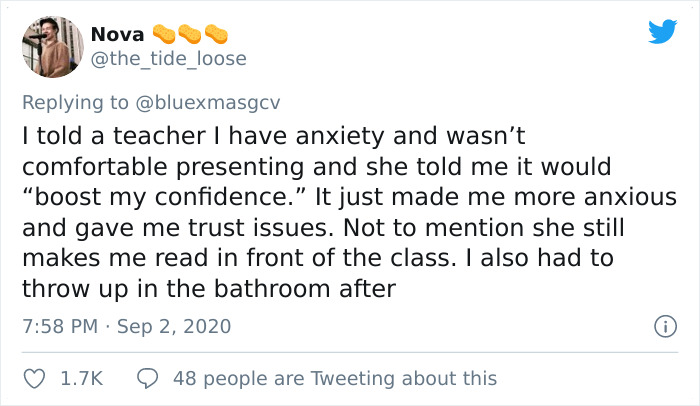
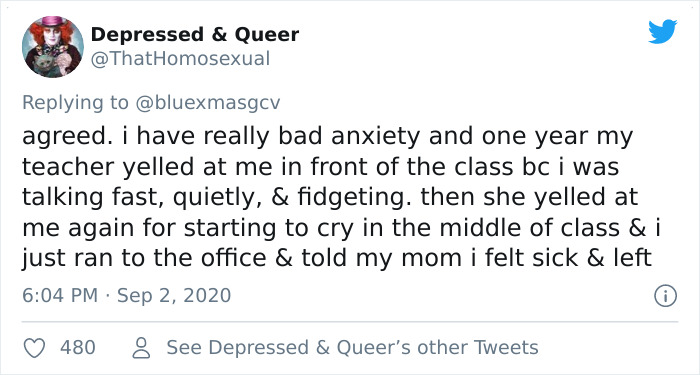
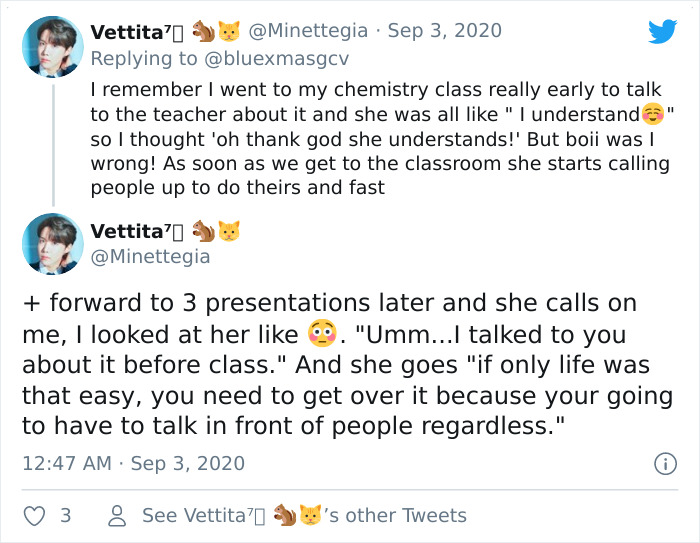
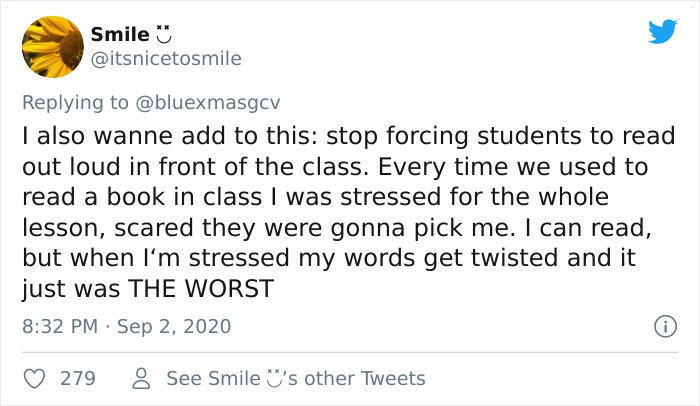
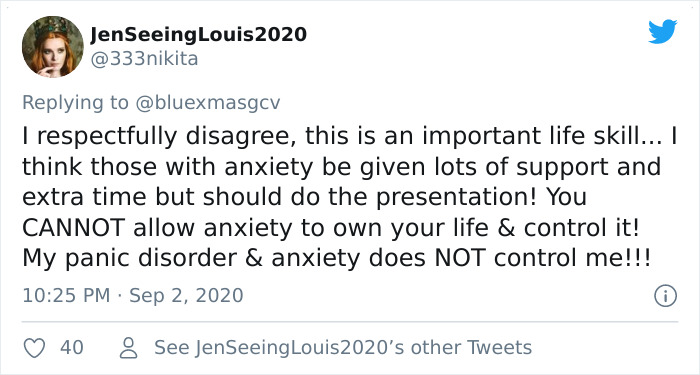
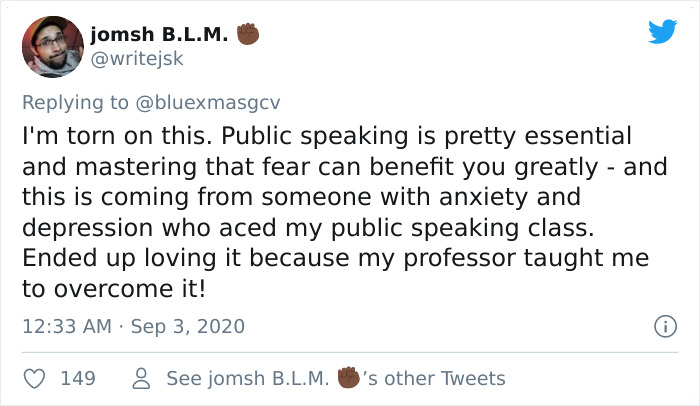
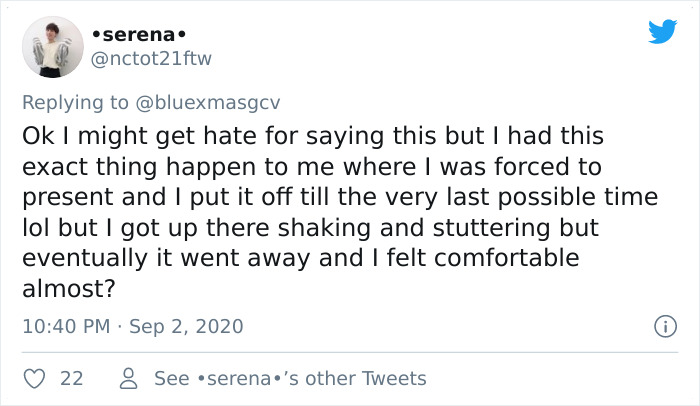
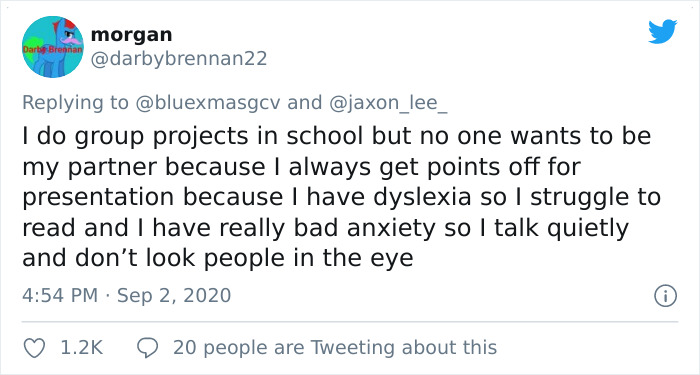
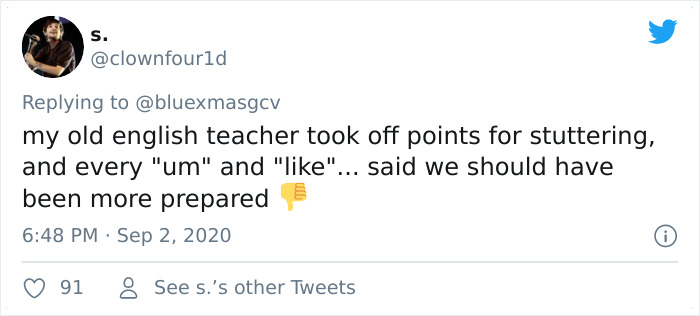
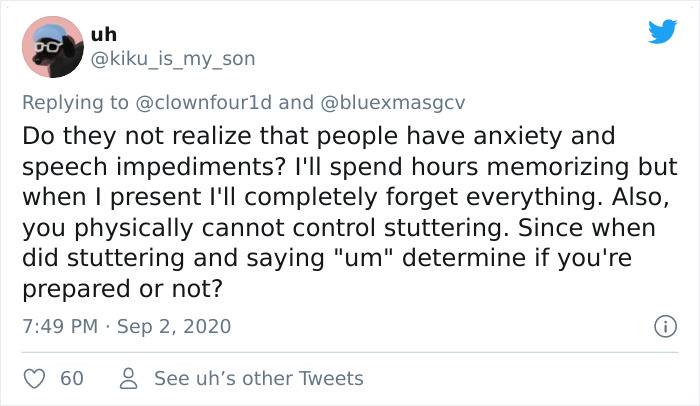
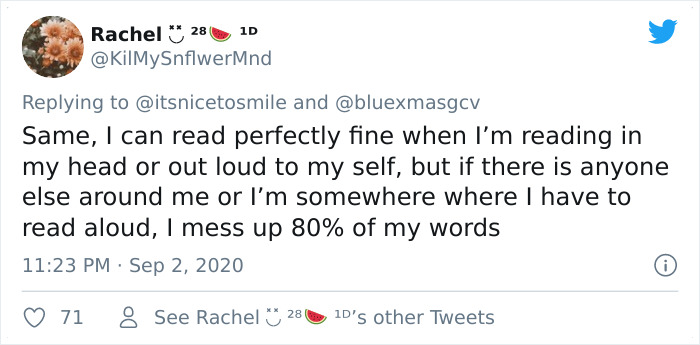
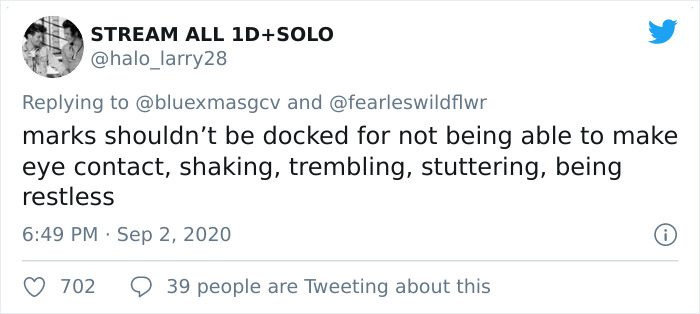
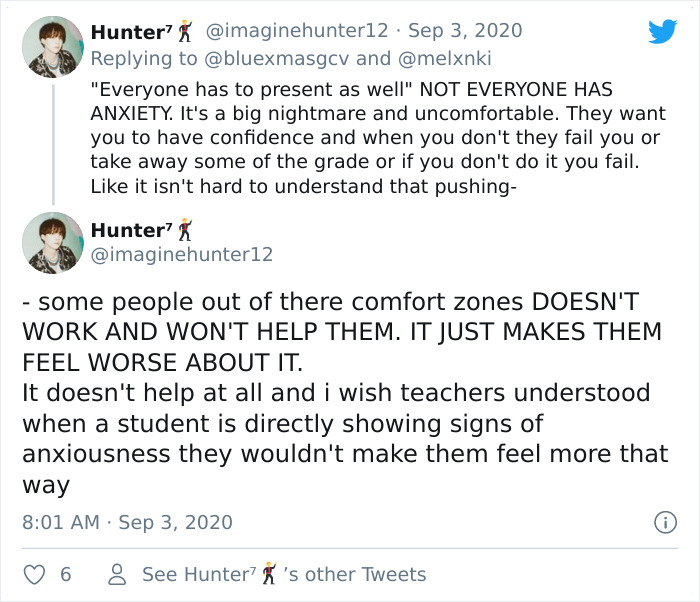
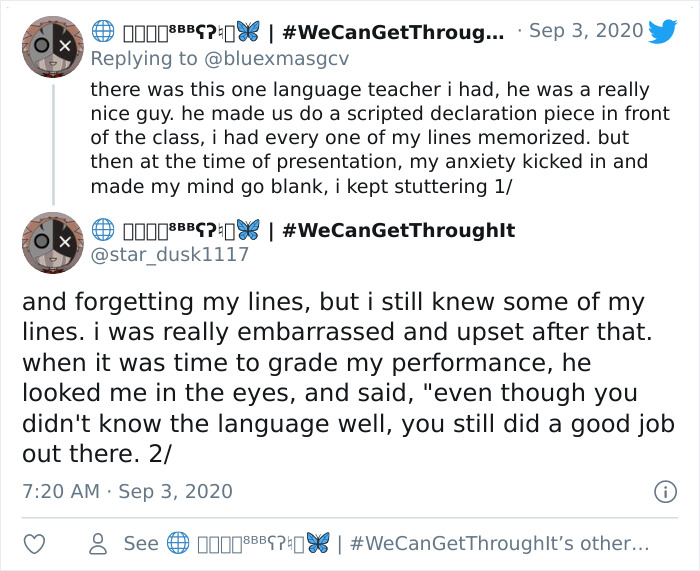
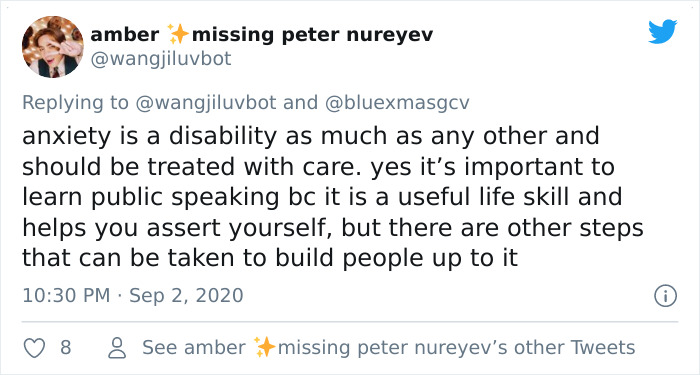
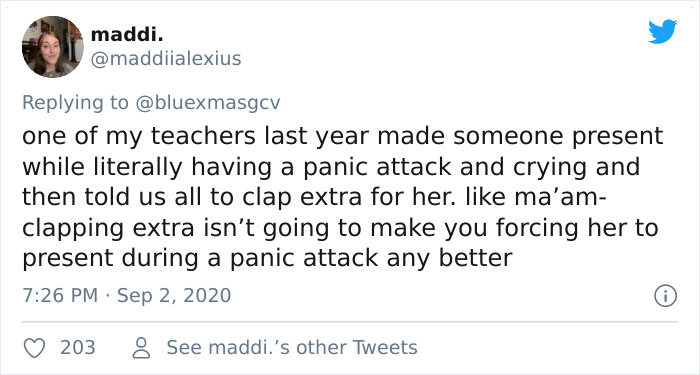
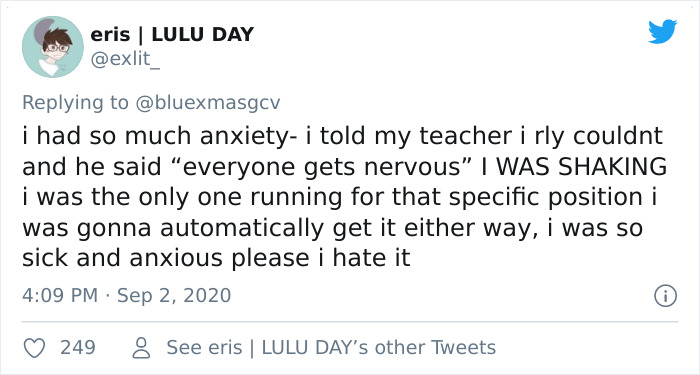




136
191